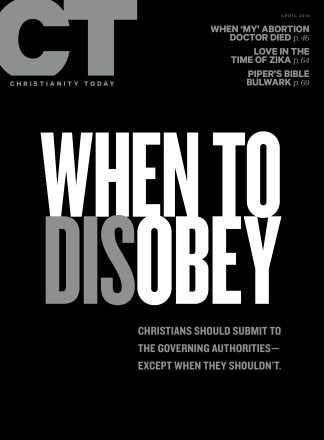Years ago, Christianity Today ran a cartoon depicting Francis Schaeffer at the Pearly Gates. Looking through the Book of Life, Peter says, “Let’s see . . . Schaeffer, Dr. Francis. I think Thomas Aquinas would like to have a word with you.”
The medieval Catholic theologian wasn’t the only Christian luminary to find himself repeatedly in Schaeffer’s crosshairs. Søren Kierkegaard was another popular target. Who can forget Schaeffer’s charge that the melancholy Dane’s notion of the “leap of faith” accelerated Western civilization’s “escape from reason” and plunged us into the “line of despair”? Due to this and similar caricatures, evangelicals have often viewed Kierkegaard with suspicion.
Fortunately, Mark Tietjen’s Kierkegaard: A Christian Missionary to Christians (IVP Academic) should help set the record straight, not least on what Kierkegaard meant by the concept of “leap.” Many Christian scholars have lauded Kierkegaard as an orthodox ally. But Tietjen, chaplain at the Stony Brook School in New York, goes further. Writing for those who don’t know philosophical and theological jargon, he shows how Kierkegaard’s body of work bears witness to the fact that nominal Christianity is no Christianity at all.
To clear away the debris, Tietjen first gives an overview of Kierkegaard’s life and thought. Tucked away in this defense of Kierkegaard’s theological credentials is a fine explanation of why Christians shouldn’t be suspicious of philosophy. The resulting picture is that of a rigorous Christian thinker faithfully working in the Reformed Lutheran tradition: a rightful heir to Luther at his best, and a forerunner of later heroes like Bonhoeffer. In particular, Kierkegaard paved the way for analyzing how the church becomes party to the “cheapening of Christianity.”
Tietjen helpfully explains that Kierkegaard’s mission was to make Christianity more “difficult” for Christians. In 19th-century Denmark, he notes, “the claims of Christianity deteriorated into little more than the rote doctrine that one must memorize to be confirmed. Rather than marveling at the great paradox that God became a human to save us from our sins, Christianity as a cultural institution merely assumed that belief, finding it trivial and easy to believe.” But Kierkegaard warned that Christianity cannot be “as simple as pulling on one’s socks.” In all his writings, Kierkegaard sought to show that faith in Jesus demands absolute passion and dedication, not mere assent to a “Christian worldview.”
The rest of the book takes stock of how Kierkegaard sought to disturb nominal Christians long enough for them to consider the gospel. As Tietjen’s subtitle suggests, Kierkegaard understood himself as a missionary to cultural Christianity. The book provides ample commentary on Kierkegaard’s high view of Christ, his relatively low view of human nature, his unique perspective on Christian witness, and his conviction that faith is more than receiving a litany of doctrines.
Tietjen’s most powerful sections delve into Kierkegaard’s attack on Christendom and its leaders. By preaching a cognitive version of Christ, the pastors of Kierkegaard’s day convinced hearers to admire him and even believe in him as the Son of God. But as “Kierkegaard clarifies, Jesus did not come to be admired, but to get followers, to be imitated.” What happens when a preacher cannot say, with the apostle Paul, “imitate me as I imitate Christ” (1 Cor. 11:1)? As Kierkegaard answered in Practice in Christianity, “Preaching is abolished,” with church leaders reduced to making interesting theological “observations” that don’t change people’s lives.
Historically, evangelicals have focused almost obsessively on apologetics and doctrinal precision. These are not bad things, Kierkegaard would say. But they are not the essence of Christianity. To be pure in heart means repenting of our sins, reorienting our will to obey Jesus, and suffering willingly on his behalf. We still need a “missionary to Christians,” and Tietjen reconnects us with someone who fits the job description as well as ever.
Gregory Alan Thornbury is president of The King’s College in New York City. He is the author of Recovering Classic Evangelicalism: Applying the Wisdom and Vision of Carl F. H. Henry (Crossway).











